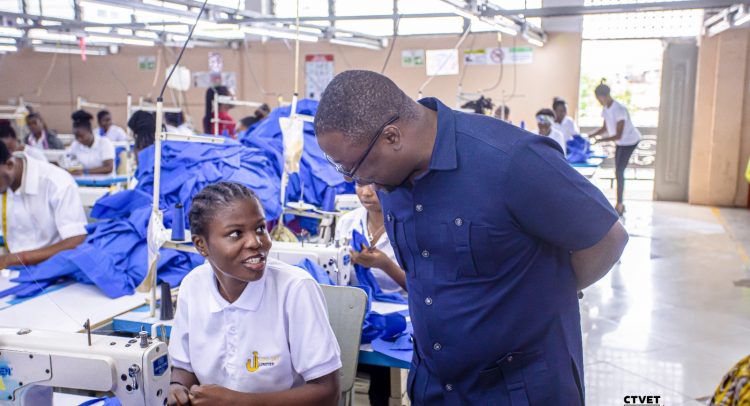The Past: A Tradition of Skills and Survival
Apprenticeships in Ghana have deep historical roots; they have long been an integral part of Ghana’s rich culture. In the pre-colonial years, they served as a vehicle for cultural enrichment, economic empowerment, social integration and a means of serving the community. During and after the colonial era, they evolved as a practical response to the limited access to formal education introduced by colonial masters. For decades, young people, especially those from low-income households, entered into informal agreements with master craftspersons to learn trades such as auto mechanics, baking, carpentry, dressmaking, and electronics.
These traditional apprenticeships were largely unregulated, with training quality depending heavily on the skills and goodwill of the “master” or “mistress”. However, as formal education gained prestige, apprenticeships began to be seen as a last resort—an option for those who could not succeed academically. This perception, though unfair, contributed to the undervaluing of vocational skills in Ghanaian society. Despite their informal nature, apprenticeship schemes have been crucial in providing labour and economic benefits. The World Bank estimates that in urban Ghana, 40% and 25% of self-employed and wage-employed workers, respectively, had undertaken an apprenticeship by 2016. Apprenticeship training was responsible for educating nearly four times as many individuals as all other formal training alternatives combined.
The Present: A Bold Government Intervention
Since 2017, Ghana has invested over GHS 6 billion in Technical and Vocational Education and Training (TVET), the highest in its history. This investment reflects a clear commitment to equipping young people with industry-relevant skills and creating pathways to employment or entrepreneurship. In recent years, the Government of Ghana has gone a step further. Recognising the persistent challenge of youth unemployment (where over 50% of Ghanaian youth face underemployment or are not engaged in productive work), the government launched the National Apprenticeship Programme (NAP). This initiative, hailed by the National Youth Authority as the greatest social intervention in Ghana’s history, aims to formalise and modernise apprenticeship training across the country.
The NAP is designed to provide free, high-quality training that blends 30% classroom instruction with 70% hands-on workplace learning. It targets high-impact sectors such as ICT, agriculture, renewable energy, fashion, and automotive. Importantly, the programme is inclusive: 40% of slots are reserved for women, and 5% for persons with disabilities. The government covers all apprenticeship fees, and participants receive the necessary tools and resources to succeed. It is now incumbent upon the government and other associated agencies to ensure that proper monitoring and accountability processes and systems are in place for this great initiative to be fruitful; otherwise, it is doomed to fail or become ineffective. It must learn from past mistakes that led the Africa Education Watch (Eduwatch) to express “significant concerns regarding the funding of critical education programs” in Ghana.
The Future: Learning from Global Best Practices
While the NAP is a commendable step forward, Ghana can further enhance its apprenticeship system by looking to global best practices. The vocational focus of the NAP is vital for foundational skills, but to address the nation’s skills mismatch, under employment and foster higher-economic-impact jobs, Ghana can learn from countries like the UK. The UK, with centuries of national apprenticeship experience, recently introduced degree apprenticeships to contribute to turbocharging its economic productivity. These innovative programs allow individuals to earn a university degree while simultaneously working and gaining invaluable industry experience. Despite being relatively new, evidence overwhelmingly suggests their effectiveness. Some nations even offer PhD level apprenticeships, demonstrating the potential for advanced vocational pathways. There’s compelling evidence that higher-level apprenticeships yield greater economic benefits than their lower-level counterparts.
Therefore, Ghana’s future apprenticeship trajectory should increasingly move towards these advanced models. By adapting concepts like degree apprenticeships to its context, Ghana can create advanced pathways for vocational learners, enabling them to progress from basic skills training to degree-level qualifications. This will not only elevate the status of apprenticeships but also bridge the growing gap between academic qualifications and labour market needs.
Conclusion: A Pathway to Prosperity
Apprenticeships offer numerous benefits. They provide young people with practical, marketable skills; reduce unemployment; and foster entrepreneurship.
In Ghana, where the informal sector remains a major employer, apprenticeships are a practical solution to bridging the skills gap and promoting inclusive economic growth. However, for apprenticeships to remain relevant in a rapidly changing world, they must evolve. The future of work demands higher-level skills, digital literacy, and adaptability.
By incorporating higher-level formal certification, digital training, and pathways to higher education (such as degree apprenticeships), Ghana can transform its apprenticeship system into a dynamic engine for national development. The government deserves high praise for the bold and inclusive National Apprenticeship Programme. But now is the time to look ahead. By embracing the concept of degree apprenticeships, Ghana can ensure that its youth are not just trained but truly empowered to lead the country into a prosperous future.
DISCLAIMER: The Views, Comments, Opinions, Contributions and Statements made by Readers and Contributors on this platform do not necessarily represent the views or policy of Multimedia Group Limited.
DISCLAIMER: The Views, Comments, Opinions, Contributions and Statements made by Readers and Contributors on this platform do not necessarily represent the views or policy of Multimedia Group Limited.


